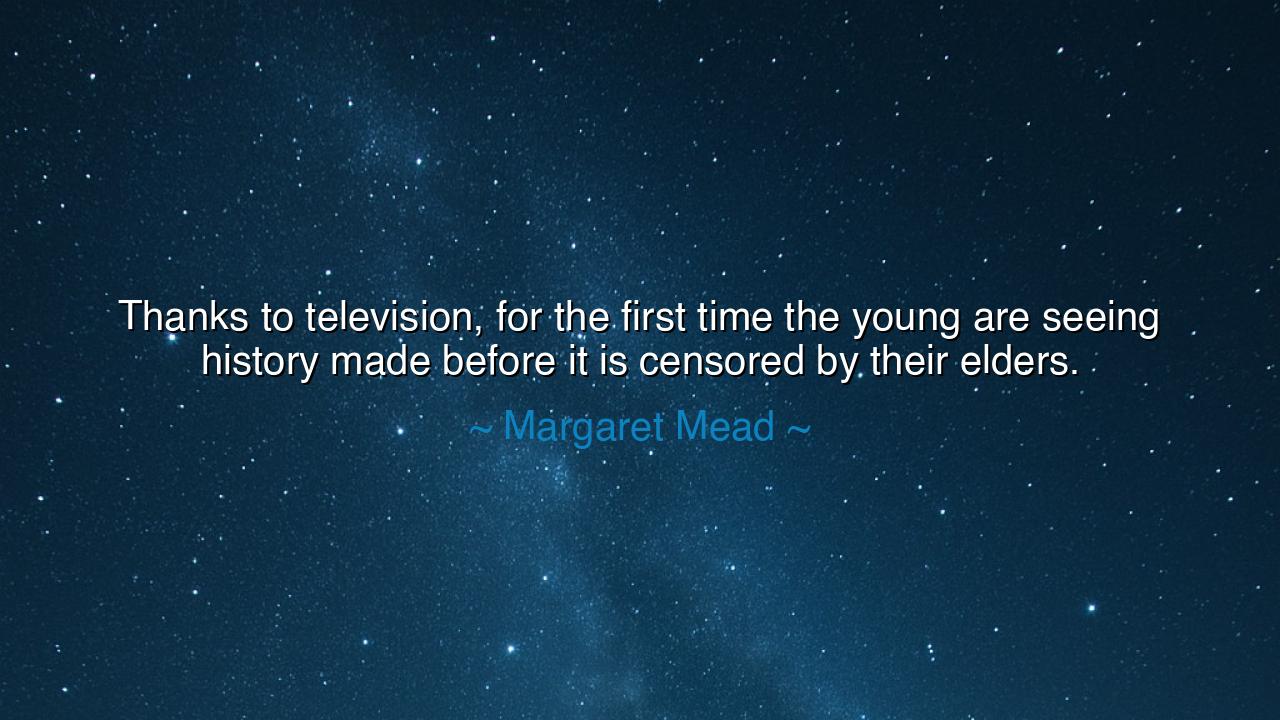
Thanks to television, for the first time the young are seeing
Thanks to television, for the first time the young are seeing history made before it is censored by their elders.






“Thanks to television, for the first time the young are seeing history made before it is censored by their elders.” Thus spoke Margaret Mead, the wise anthropologist and observer of the human spirit, whose eyes saw the unfolding patterns of civilization as others might read the lines of a face. In these words, she proclaimed a revolution of vision — the moment when the veil that once separated generations began to tear. For she saw that with the coming of television, the guardians of tradition could no longer shield the young from the raw pulse of truth as it beat across the world. History itself, once filtered and softened by the tongues of the powerful, was now flashing, unedited, into the hearts of the children.
Before this age of screens and signals, the story of the world was told by the elders — priests, rulers, and teachers who chose what to reveal and what to conceal. The young learned not history as it happened, but history as it was remembered, shaped, and sanctified. A battle might be retold as glory, a revolution as chaos, a protest as a riot. But with the rise of television, the mirror of human experience grew more immediate and more merciless. The young no longer waited for the ink to dry in books; they saw, in living color, the march of soldiers, the cries of protestors, the faces of both courage and cruelty.
This transformation came to life most vividly during the Civil Rights Movement of the 1960s. When cameras turned their gaze upon the streets of Selma, Birmingham, and Montgomery, the world could no longer pretend not to see. The young — both black and white — watched in real time as men and women were beaten for daring to walk in dignity. No teacher could soften this lesson; no elder could rewrite it before the evening news arrived. And in that moment, Mead’s prophecy was fulfilled. Television became not merely entertainment, but revelation. It awakened a generation to the truth that history was not something that happened long ago — it was happening now, and they were witnesses to it.
Yet Mead’s words also carry a warning. For the power to see truth does not always bring the power to understand it. The young, with their unguarded eyes and open hearts, are exposed to the full storm of human experience — the beauty and the brutality alike. Without the wisdom of discernment, they may see but not yet know. Thus, her observation calls not only for celebration, but for guidance — that elders, instead of hiding history, should help the young interpret it, lest they mistake the noise of the world for its meaning.
Still, there is grandeur in this new seeing. It is as though humanity has entered a new era of light, where shadows cannot so easily conceal injustice. Just as the printing press once freed knowledge from the monasteries, so did television free the truth from the grip of the few. The ancient chain — the control of knowledge by age and authority — was broken. And though chaos sometimes followed, so too did awakening. For only when the young see the truth with their own eyes can they rise to challenge it, reshape it, and carry it forward into a better dawn.
Let us recall also the sight of the Vietnam War broadcast into living rooms across America. For the first time, the horrors of battle were not whispered about but witnessed: villages burning, soldiers weeping, children fleeing from fire. The elders who glorified war could no longer hide its price. The young rose in protest — not from rumor, but from sight. They had seen enough to understand that truth, once revealed, demands response. This is what Mead meant: that once the light reaches the eyes of the young, the world itself begins to change.
So, my children of the modern age, learn from this: seeing truth is not enough; you must act upon it. Use the power of your own eyes — now multiplied by the infinite mirrors of technology — not for idle watching, but for wisdom. Question what you see, but never turn away from it. For though the elders may seek to reshape the story, your vision, unclouded by habit, can become the torch that guides humanity forward.
Remember, then, the lesson of Margaret Mead’s words: each generation inherits not only the world, but the lens through which it is seen. Guard that lens well. Clean it with truth, polish it with compassion, and use it to illuminate, not to distort. For the moment the young learn to see — truly see — the world as it is, unfiltered and unforgotten, that is the moment when history itself begins to change.






AAdministratorAdministrator
Welcome, honored guests. Please leave a comment, we will respond soon